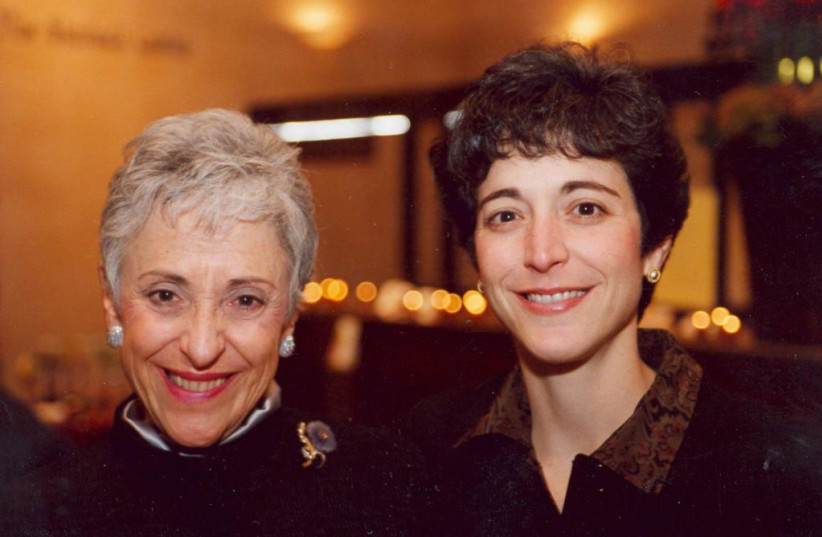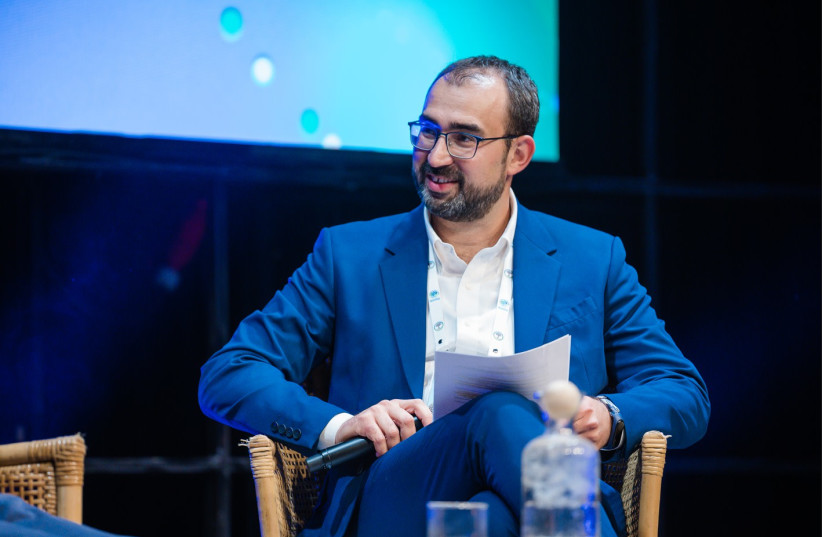When Beri Rozenberg entered a new role as director of the ROI Community, the world was in the midst of a pandemic that has never been seen before. Many thought that the situation was to his disadvantage, but Rozenberg, who worked for many social ventures in Israel, thought otherwise.
“I began my position when we were a year into the COVID-19 pandemic,” he told The Jerusalem Post this week, during ROI Community’s annual summit, which relaunched after a three year hiatus. “I was expected to lead a community with a long-standing infrastructure, that was around for 15 years, with 1,600 members (now 1750 members),” Rozenberg portrayed the situation.
But he said that he recognized a blind spot that many Jewish communities experienced– and ROI’ers, as the community members are called, can offer solutions. “From our experience, field activists have a faster ability to react immediately to emergency situations than larger organizations, countries or municipalities.”
Rozenberg said that ROI community members created hundreds of initiatives. “We created an option for our members to receive small grants as an incentive - in order for this to be the accelerator for social change ventures.”
Some of the initiatives that ROI community supported or helped facilitate are an establishment of volunteer headquarters for assisting the elderly in Israel and Jewish communities around the world; a group that dealt with Russian speakers and their challenges; Assisting elderly Israelis living in the periphery; supporting organizations that assist with food security; promoting solutions for education during a pandemic, and many others.

“An Israeli member of ROI named Jonathan Blumenfeld is an amazing artist who organized a project called ‘If Grandma Had a Musician’ which promoted musicians to play music in front of nursing homes,” Rozenberg said, adding that “we have a member from India who dealt with mask distribution in her country because that was the most critical challenge.” He explained that “there were also congregations and synagogues that failed to congregate in synagogues - so a lot of content was developed online as a result.”
ROI Community invested hundreds of thousands of dollars in supporting these small yet impactful initiatives in tens of countries.
ROI COMMUNITY is an international network of 1,750 Jewish activists, entrepreneurs and innovators in their 20s and 30s who enhance Jewish engagement and foster positive social change globally. “ROI is a cohesive community where members come together in person, online and in spirit to support one another and collaborate in their mutual quest to strengthen Jewish communities and improve society,” the community’s website states.

“Through its capstone Summit and an innovative suite of ongoing opportunities for professional development, networking and financial support, ROI empowers its members to take an active role in shaping the social landscape of Israel and the future of the Jewish and broader worlds.”
ROI Community is an initiative of the Charles and Lynn Schusterman Family Philanthropies, a global foundation that works mainly in the United States and Israel.
ROI organizes a five-day professional development gathering where 150 of “the Jewish world’s brightest young minds” from every corner of the globe meet face-to-face in Jerusalem. The Summit acts as the gateway into the ROI Community: once an individual participates, they become an ROI member. The community is an active, ongoing one where members connect and create with one another and offer each other strategic support and advice on different aspects of their personal and professional lives.
“ROI is built on social gatherings, so the pandemic forced us to move everything online,” Rozenberg said. “We created virtual meetings and the ROI TV platform that made it possible to get organized.”
Yet Rozenberg repeated that there is no digital content in the world that can create social change “without looking each other in the eye.” He said that “I'm glad the summit is back this year. The energy of the personal encounter with the geographical diversity of 25 countries is irreplaceable. We have a new member who is a Swiss Jew living in Bangladesh and new members from the UAE, US, Israel and other countries - in one space.”
THE THEME of this year’s summit is Shemita, the seventh year of the seven-year agricultural cycle mandated by the Torah in Israel for the land a people to rest during this year. “We learned throughout the summit how to release old habits and adopt new ones and we learn this from Jewish culture. We focus on connections to share new ideas together," he said.
"We are also focusing on the term Hakel [a biblical commandment of assembling all Israelite men, women and children to hear the reading of the Torah by the king of Israel every seven years]; how to put these ideas together into a more focused social change strategy.”
Rozenberg, who was very active in the Russian-speaking Israeli community, said that during the Russian-Ukrainian war, the community again proved its purpose. “In the last year we have been busy trying to learn how to take the infrastructure we have and exhaust the knowledge and talents. We asked ourselves: How can we create change?”
“Ukraine was an excellent case study,” Rozenberg said. “First of all, we have members of our community from Ukraine who needed our assistance. But there were hundreds who were eager to help - and they did.”
ROI held an international community meeting of about 120 members - online. “We heard from a community member who told of how she operated the Jewish Center in her city in Ukraine,” he remembered, “and then, one of our members created a WhatsApp group that has been active ever since.
"For example, one member is a senior official in a global high-tech company. He wanted to distribute aid to refugees; food packages, an aid delegation from his company. So we have community members in humanitarian organizations such as IsraAid and others who helped him make this possible.”
ROI OFFERED small grants of about $10,000 for delegations to the borders surrounding Ukraine.
One of these delegations was run by ROI’er Aharon Ariel Lavi, who serves as director of Hakhel, the Jewish Intentional Communities Incubator in the Diaspora.
Lavi told the Post that “We have 140 intentional communities in 30 countries, and six of these communities are in Ukraine.”
“The Jewish Agency and the JDC are slowly changing the focus of their activity in Ukraine and we created intentional communities in order to fill this gap," he said. "We build local leadership, charities, education and social activism all over Ukraine.”
One of the members of Hakhel communities was killed during the war. Lavi explained that “the community in Lviv, which is in the west of Ukraine, is one of our strongest communities. Therefore, we built a center in Lviv to assist Jewish refugees and to send food shipments throughout Ukraine.”
Lavi explained that it wasn’t necessarily the funding of delegations that ROI assisted him with, but rather the communal effort. “The fact that there was an active WhatsApp group allowed me to find assistance for what we needed on the ground from other ROI members.
"The group also gave me a feeling that I wasn’t alone. There are mental and financial consequences on a personal level since I've put my entire life into this project for the past two months,” he said dramatically.
“Community members, for instance, helped when we needed to find a Jewish refugee a place to sleep for a night or two. One member from a tech company donated 60 laptops that helped us - but we didn’t need so many, so we were able to see who could benefit from them through the group.”
AFTER YEARS of activism, ROI’er Alex Riff founded the One Million Lobby organization during the pandemic, in order to promote the economic and social interests of 1.5 million Russian-speaking Israelis. "The trigger for this was the coronavirus," she said. "During the pandemic, my 68-year-old mother continued to work full-time as a cleaning lady. That's how I realized it was time for the next step.” She continued by saying that “today I am the organization's general director.”
The organization deals with three main topics, socio-economics concerning the elderly population from the former USSR in Israel; issues of religion and state, including conversion and marriage; and in recent months, in wake of the war in Ukraine, “we have realized that we must act quickly to create an absorption experience that will benefit immigrants and refugees.”
Riff was also able to promote this venture with help from ROI and other members of the community. “The strength we have been able to achieve thanks to collaborations allowed us to respond quickly and demand to be at the decision-making table,” she said. “During the pandemic, the ROI community and the Schusterman Foundation are the ones who gave me the push forward from the first moment.”
With the help of the ROI community, Riff said that “the community gave me tools, connections – and especially hope," she said. "In addition, I understood that social entrepreneurship doesn’t have to be one person against the entire world, but rather together, with entrepreneurs and partners who are an integral part of the process – and the success of the One Million Lobby in the past year, especially during the Ukraine war.”
“My mom is an eternal optimist, and my dad was too,” Stacy Schusterman, Chairperson of the Charles and Lynn Schusterman Family Philanthropies said at the opening event of the ROI Community summit this week. “I admire that trait,” she said of her parents.
“As I have stepped into my role as chair of our organization, I have been working on embracing my more optimistic side. After all, before we can achieve any kind of lasting change, we first have to believe that it is possible. And I do,” Schusterman said.
“I look at the history of Israel and the Jewish people. Born as a far-off dream, today the State of Israel is a thriving nation with a bright future," she said. "Likewise, for all the challenges that remain, Jewish life is experiencing a renaissance, thanks to the vision, hard work and commitment of many.”
Schusterman explained that she agrees with civil rights activist Stacey Abrams, and quoted her: “'determination works better than hope.' It is when hope feels the most distant that we need to push the hardest and stay determined in our efforts for positive change.”
“That is why, over the past few years, we have been expanding our work at the Schusterman Family Philanthropies to support more efforts to shape just and inclusive societies in the United States and Israel,” she said.
She told the new ROI’ers that she’s “impressed and inspired” by the work they are doing "and your perspectives on the world.”
Schusterman concluded by explaining that “we believe that networks serve as effective multipliers. They amplify the work of individuals, create the type of friction that fosters innovation, and enable effective solutions to be strengthened and scaled. This is the type of impact we are striving for.”
